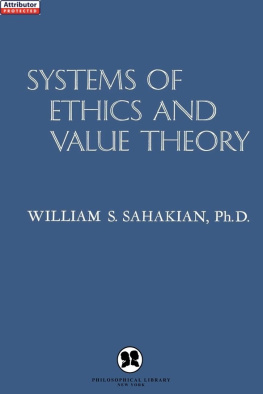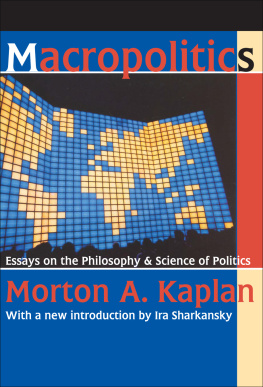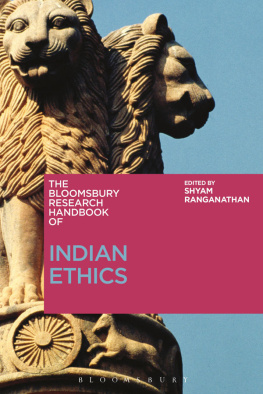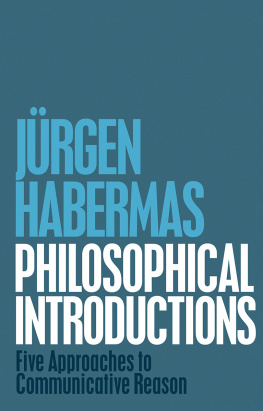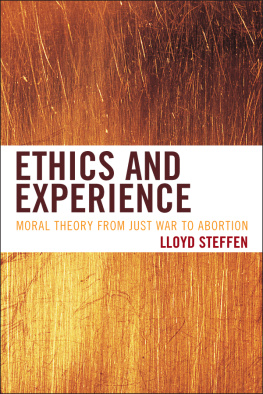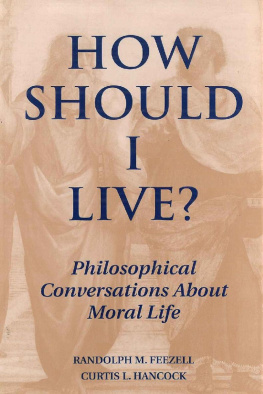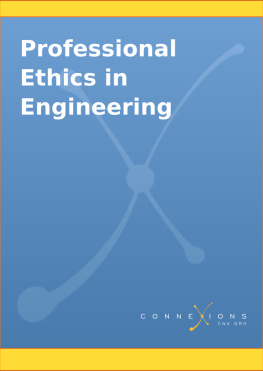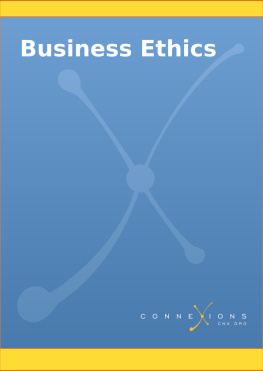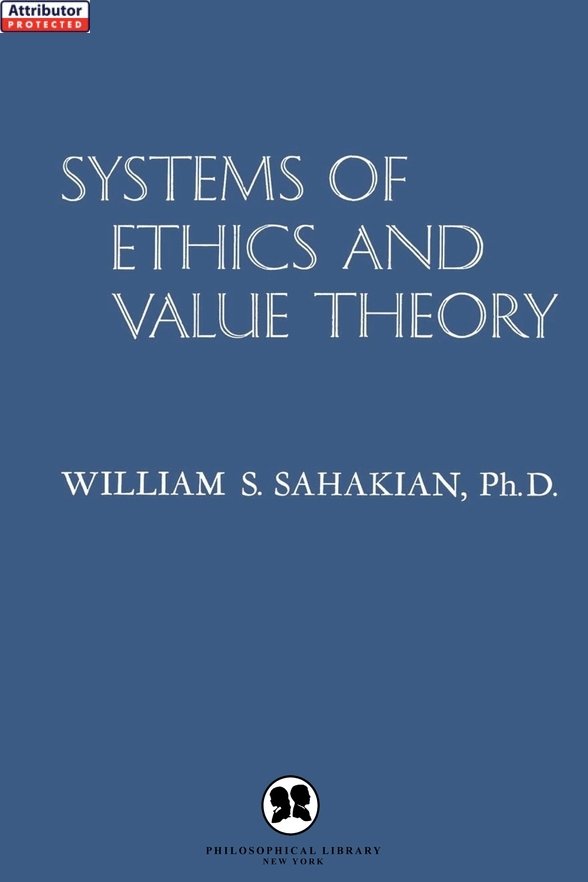ACKNOWLEDGMENTS
The writer is indebted to the following authors and publishers for inclusion of copyrighted material into this text: Aristotle, Nicomachean Ethics tr. by W. D. Ross, Oxford University Press; Immanuel Kant, The Fundamental Principles of the Metaphysics of Ethics tr. by Otto Manthey-Zorn, Appleton Century Crofts; Kants Critique of Practical Reason, and Other Works tr. by Thomas Kingsmill Abbott, Longmans, Green and Co. ; Plato, Philebus tr. by Harold N. Fowler, and Xenophon, Memorabilia tr. by E. C. Marchant, Harvard University Press; The Interpreters Bible, Abingdon Press; Basic Writings of St. Thomas Aquinas ed. by Anton C. Pegis, Random House, Inc. ; Friedrich Nietzsche, Beyond Good and Evil tr. by Marianne Cowan, Henry Regnery Co.; The Birth of a Tragedy and The Genealogy of Morals tr. by Francis Golffing, Doubleday and Co. ; other quotations from Nietzsches works are translated by Walter Kaufmann, Princeton University Press; Soren Kierkegaard, The Sickness unto Death, and Either/Or tr. by Walter Lowrie, Princeton University Press; Concluding Scientific Postscript, tr. by David Swenson and Walter Lowrie, Princeton University Press; Journal tr. by Alexander Dru, Oxford University Press; Purity of Heart tr. by Douglas V. Steere, Harper and Brothers; John Dewey, Reconstruction in Philosophy and Human Nature and Conduct, Henry Holt and Co., Problems of Men, Philosophical Library, The Quest for Certainty, Minton Balch and Co., Theory of Valuation in International Encyclopedia of Unified Science, University of Chicago Press, Ethics with J. H. Tufts, Henry Holt and Co.; G. E. Moore, Ethics, Oxford University Press, Principia Ethica, Cambridge University Press; Josiah Royce, The Philosophy of Loyalty, the Estate of Josiah Royce, Harvard Trust Company, Cambridge, Mass.; Edward Westermarck, Ethical Relativity, Routledge & Kegan Paul, Ltd. ; Harcourt, Brace and Co., The Origin and Development of the Moral Ideas, Macmillan and Co. and St. Martins Press; Ralph Barton Perry, General Theory of Value and Realms of Value, Harvard University Press; Moritz Schlick, Problems of Ethics tr. by David Rynin, Prentice Hall, Inc. ; A. J. Ayer, Language, Truth and Logic, Victor Gollancz Ltd. and Dover Publications, Inc., Bertrand Russell, Religion and Science, Oxford University Press; The Philosophy of Bertrand Russell ed. by Paul A. Schilpp, Northwestern University Press; Charles L. Stevenson, Ethics and Language, Yale University Press; C. E. M. Joad, Critique of Logical Positivism, Victor Gollancz Ltd.; Epictetus, Discourses and Fragments, tr. by P. E. Matheson, Oxford University Press; and Epicurus Extant Writings, tr. by Cyril Bailey, Oxford University Press.
The author wishes to express his gratitude to the many persons who assisted him in this undertaking, but particularly to Dr. Mabel Lewis Sahakian of Northeastern University who labored many hours to see this work to its completion and to whom this book is affectionately dedicated, and to Dean Charles W. Havice of Northeastern University whose constant encouragement and advice transformed what would have been a laborious task into a pleasurable adventure.
W. S. S.
ARISTOTLE
Those who love in excess also hate in excess.
(A saying quoted by Aristotle)
1. Nicomachean Ethics
The ethical school of thought of Aristotle is termed the Self-Realization School of Ethics, but one is cautioned not to confuse it with the name of Aristotles university, viz., the Lyceum. The principal interest of the present discussion is in his book entitled: Nicomachean Ethics, named after Aristotles son, Nicomachus. Scholarly opinion regarding the naming of the book differs; the discrepancy arising from the fact that Aristotle himself did not personally write the book, at least, not the finished product which constitutes a compilation of the notes of Aristotle. The conclusion arrived at by some scholars is that the book was merely dedicated to Nicomachus, while others surmise that Nicomachus edited the work. There are those who go so far as to conjecture that it was Nicomachus who wrote the book rather than Aristotle, at least, this was Ciceros intimation. Other philosophers contend that the notes, if not the finished treatise, may represent a collective endeavor involving a multiplicity of contributors. Some scholars maintain that the works attributed to Aristotle are considerably more than a single man could possibly have accomplished through unaided efforts; consequently, they feel entitled to infer that it is the product of his universitys combined faculty. For present purposes, it need only be regarded as the direct and sole work of Aristotle.
At this point, it is probably worth mentioning that besides the Nicomachean, there are two other versions: Eudemian and Magna Moralia; the Magna Moralia is ignored by most professors because its content is merely a collection of excerpts from the former two that a Peripatetic used for lecture notes. Aristotles school was referred to, colloquially, as the Peripatetic School of Philosophy because its members would promenade about as they discussed and lectured on philosophy; peripatetic literally means to walk about. Some scholars reject the Eudemian version as spurious, but this controversy will not affect the present treatment as it will be restricted to those ten books which compose the Nicomachean Ethics together with pertinent excerpts from the Politics.
A proper treatment of the ethics of Aristotle should include a study of the Politics since this book is the logical continuation of his efforts in moral theory. Aristotle takes the position that politics is social ethics and one cannot attain an ethical goal except in a society: the complete science of politics falls into two parts which may for convenience be called ethics and politics. Aristotles ethics, no doubt, are social, and his politics are ethical; he does not forget in the Ethics that the individual man is essentially a member of a society, nor in the Politics that the good life of the state exists only in the lives of its citizens. The concluding books of the Nicomachean Ethics constitute a discussion on friendship followed by one on happiness both of which serve as a transition into his social ethics, viz., the Politics.
2. Definition of Ethics and Related Terms
At this point, some definitions, together with their reciprocal relationships, appear to be in order, particularly for terms such as: ethics, morals, social ethics, politics, sociology. Ethics has been defined as the study of the right and the good, i. e., right conduct and the good life; whereas, morality is the practice of what one believes to be right and good. Ethics is a study, hence is theoretical, whereas, morality is pragmatic; it involves doing, acting, behaving. An expert in ethics is not necessarily a highly moral person; his morals may border on mediocrity or suffer complete deterioration; on the other hand, the moral person may be incapable of passing a simple examination in ethical theory. Summarily, ethics applied becomes morality; and morality theorized or studied is ethics.
Etymologically, the word moral comes from the Latin: mos, mores, which means customs or manners; ethic comes from the Greek: ethike and means the science of character; The term, ethics, usually pertains to personal morality; when the word is used collectively in application to groups, then it becomes the study of social ethics, i. e., the manner in which a society ought to behave. Politics and sociology are social sciences and as sciences, their province is restricted to a description of the facts; scientists do not evaluate, i.e., pass moral judgments, such as philosophers do; however, political theory as it is studied today in many universities is social ethics, i. e., social or political philosophy.

